Text
文法:〜ては(If・Because + Bad Result/Whenever ~/Repetitive Actions)
A(て-form)+は、B。
In spoken Japanese, ては and では become the contractions ちゃ and じゃ respectively.
We’ve seen ては combine with phrases like ならない、だめ、いけない to mean something that you “must not do.” However, ては has several different uses.
If・Because + Bad Result
Aては、B。
(A[普通形]+のでは、B。)*
If/Because A, then B (Bad Result).
This is the base form for the grammars てはいけない and しなくちゃならない. ては is a conditional whose usage is very similar to ~たら, but while ~たら is neutral, ては carries a negative implication. It's used to express a negative result due to some action, or even just one's negative reaction to that action.* While it's common to see it paired with だめ・ならない・いけない like in the above grammars, it is not limited to those endings.
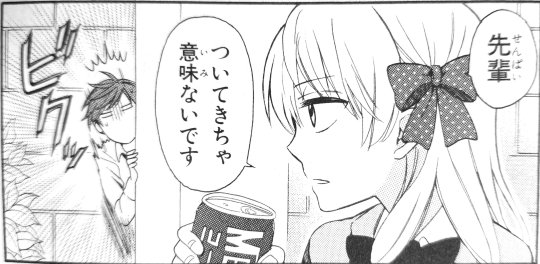
先輩 ついてきちゃ意味ないです[ビクッ]
Senpai, there's no point if you're just going to follow me. [Startled]
[Speaker is on an errand from Senpai to fetch a drink.]
(『月刊少女野崎くん』 Girl’s Monthly Nozaki-kun,vol. 1 by Izumi Tsubaki)
Of course, depending on the translation, these alternate endings can still carry the meaning of "that must (not) be."

未来の僕の奥さんに傷が残っちゃ大変だ
It would be a problem if my future wife were scarred. (= I can't allow my future wife to be scarred.)
(『魔法使いの嫁』 The Ancient Magus' Bride, vol. 1 by Yamazaki Kore)
Whenever ~
While て-form is used to simply connect two clauses to indicate a simple sequence of actions, ては is used to describe an action that keeps happening. In this case, ては is only formed from verbs.*
A(Verb) て、B。
When A, then B.
A(Verb) ては、B。
Whenever A, then B.
These actions are habitual, with B happening every time A occurs. This meaning is not necessarily negative, and the phrase is not repeated.* *
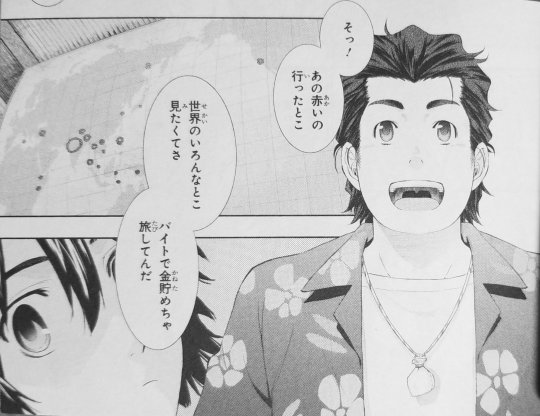
そっ!あの赤いの行ったとこ
世界のいろんなとこ見たくてさ
バイトで金貯めちゃ旅してんだ
Yeah! Those red pins are the places I've been.
See, I really wanna travel all over the world,
And I go on a trip whenever I save up enough money working part-time.
(『あの日見た花の名前を僕達はまだ知らない。』 Anohana: The Flower We Saw That Day, vol. 1 by Okada Mari and Izumi Mitsu)
Repetition
ては can be used to emphasize two actions happening over and over, similar to ~たり~たりする. However, while たり gives several examples (out of many), ては really stresses the repetition.* These two actions can be completely unrelated, even opposite actions. The ては phrase can be repeated twice, or the order of the verbs even inverted to further emphasize the repetition. This form is only formed from verbs.
A(Verb) ては、B。
Do A and B repeatedly, every day, constantly, always.
A(Verb) ては、B、AてはB。
Repeatedly A-ing and B-ing, A-ing and B-ing.
A(Verb) ては、B、BてはA。
Repeatedly A-ing and B-ing, B-ing and A-ing.
When repeated twice, the two actions are opposites (ex: turn on and off, draw and erase, eat and sleep.)*

だから何度も目覚めては 確認するにゃ
So I keep opening my eyes over and over, just to check.
[To keep the cat pun, consider: "meowny times" instead of "over and over".]
(『おじさまと猫』 A Man and His Cat, vol. 1, by Sakurai Umi)
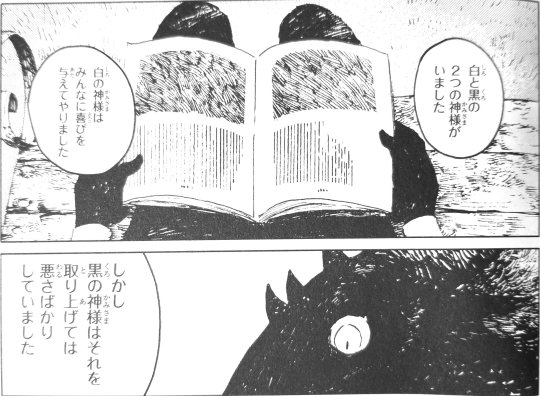
白と黒の2つの神様がいました
白の神様はみんなに喜びを与えてやりました
しかし黒の神様はそれを取り上げては悪さばかりしていました
There were two gods, one white, one black.
The white god bestowed joy upon everyone.
However, the black god constantly took that joy away, and wrought only evil.
[Language purposely elevated to keep the fairy tale/mythic feel.]
(『とつくにの少女』 The Girl from the Other Side: Siúil, a Rún, vol. 1 by Nagabe)
On top of the 3 usages above, Maggie-sensei lists a few more. Be sure to check out her page for more examples from a native speaker!
Advice & Suggestions
This one is another usage that is similar to ~たら, this time giving the advice a more elevated feel than the casual たら, or softens the impact of a straightforward ていただけませんか.
Aてはいかがでしょう。
Aてはいただけませんか。
Aては… [unfinished to allow listener to fill in the blanks]
Attempt with expected failure
ては is used to modify てみる when you're not optimistic about the outcome of an attempt.
Aてはみます。
I will at least give A a try...
J-Rock Examples:
山際も星も/ぼくらに気付いては/お話もした
Both the mountain ridge and the stars / Whenever they noticed us / Told us stories as well
[赤い光線 - 交信]
東京にすがりついては/泣きじゃくって 言えやしなくて
I’m always clinging to Tokyo / and crying and I just can’t say it
[関取花 - 東京]
革靴は知らぬうちに/あのリズムを奏でては列車中に空しく響く
Whenever my leather shoes unconsciously / tap out that rhythm, it echoes through the train in vain
[関取花 - 石段のワ��ツ]
124 notes
·
View notes
Text
文法:〜させる(使役形・Causative Tense)
The causative tense mainly describes two types of situations:
1) When someone makes someone else do something. This can be through instructions (like from a parent to child, or teacher to student), persuasion, or even force.
母は私にケーキを食べさせました。
My mother made me eat cake (even though I didn’t want to).
2) When someone lets someone else do something, either by giving them permission or by remaining hands-off and not interfering.
母は私にケーキを食べさせました。
My mother let me eat cake (for my birthday! Isn’t she the world’s best mom?).
For the most part you have to rely on context or common sense to help you distinguish between the two.
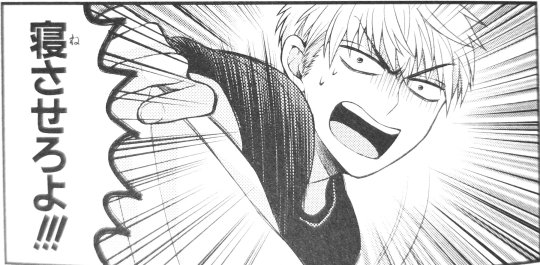
寝させろよ!!!
LET ME SLEEP!!!
(『月刊少女野崎くん』 Girl’s Monthly Nozaki-kun, vol. 4 by Izumi Tsubaki)
You can think of the sentence form as a stereotypical child/parent relationship, where the "parent" allows or makes the "child" do certain actions. Of course both could be omitted from the sentence, but even so it’s best to keep this structure in mind:
"Parent" は・が "Child" に・を (Causative verb)
"Parent" makes/lets "Child" do ~
The "Child" most commonly takes に, but it may take を instead if 1) the child unconsciously or unwillingly performs the action; 2) the child is actually a thing with no will of its own; or 3) if you are using another に particle somewhere in the sentence. Similarly if the verb is transitive and を is being used for another object, you should use に. (*)
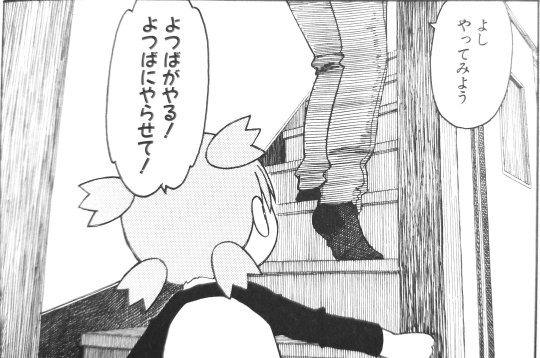
- よし やってみよう
- よつばがやる!よつばにやらせて!
- All right, let's give it a try.
- Yotsuba will try! Let Yotsuba try!
(『よつばと!』 Yotsuba&!, vol. 8?? by Azuma Kiyohoko)
Causative Tense Conjugation (Standard)
る verbs: Replace the る with させる
食べる → 食べさせる
う verbs: Replace the -u sound with -aせる
買う → 買わせる 読む → 読ませる
行く → 行かせる 急ぐ → 急がせる
立つ → 立たせる 死ぬ → 死なせる
帰る → 帰らせる 遊ぶ → 遊ばせる
話す → 話させる
Irregular verbs:
する → させる
来る → こさせる
Once in the causative tense, these verbs all conjugate as regular る verbs.
Slang Variations
There are several variations on the standard conjugation patterns.
1) Shortened Conjugation
る verbs: Replace the る with さす
食べる → 食べさす
う verbs: Replace the -u sound with -aす
買う → 買わす
読む → 読ます …
Irregular verbs:
する → さす
来る → こさす
This form is much rarer than the original form, and may be seen in dialects like Kansai-ben. It is slang, but there are some words that have made it into standard Japanese: 泳がす (to make ~ swim), 沸かす (to boil ~), and 寝かす (to put ~ to sleep). (*)
2) さ入れ言葉
Unlike shortened conjugation, this conjugation is actually nonstandard and would be marked incorrect. But much like ら抜き is growing more common with potential verbs, many young people especially may incorrectly* add an extra さ into their conjugation of う verbs like so:
買う →��買わさせる
読む → 読まさせる
While it may not be in your best interest as a language learner to use さ入れ言葉, you may hear or see it used so it’s best to be aware of its existence. (*)
(*according to textbooks, but language is a constantly evolving creature so who are we to judge!)
Causative て + Give/Receive Verbs
Combining the Causative tense in the て form with give/receive verbs is one easy clue that the causative is being used with the meaning of “Let” rather than “Make.” The speaker's role in the sentence is usually set as either the subject or the receiver by the very nature of give/receive verbs, so you’re not going to find too many counterexamples. (*) Here’s a breakdown of some combinations:
・ Causer が(私 - Doer に)〜させてくれる
(⇑Honorific: 〜させてくださる)
You are being allowed to do something, and this carries the sense that you’re grateful. A negative question would be used to ask permission.
〜させてくれない?
〜させてくれませんか?(Can’t I ...?)
〜させてください。(Please let me …)
・(私 - Causer が)Doer に 〜させてあげる
(⇓Casual: 〜させてやる)
You allow someone to do something. やる makes the expression rougher, and is used mostly by men.
〜させてあげようか?(Just this once, I'll let you ...)
〜ないと...させてあげないよ
(If you don't ~, I won't let you ...)
・(私 - Doer が)Causer に 〜させてもらう
(⇑Honorific: 〜させていただく)
Very similar to させてくれる, and describes an action you are allowed to do. However, note that the particles will be reversed since it is changed to “receiving!” It can also be used to ask for permission.
〜させてもらえない?(May I …?)
〜させていただけませんか?(May I …?)
〜させていただきます。(Allow me to…)
〜させていただいてありがとうございました。
(Thank you for allowing me to … )
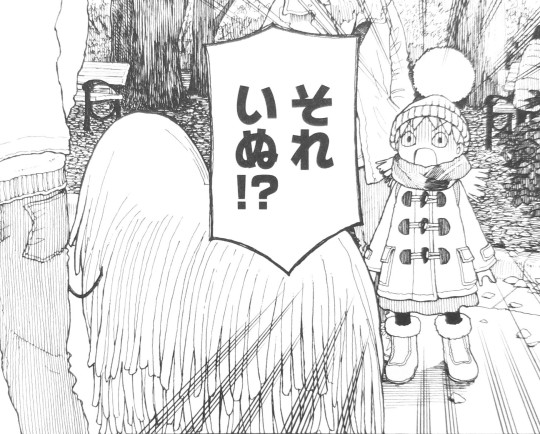

- それいぬ!?
- なでさせてもらうか?
- …いい
- That's a DOG?!
- Shall we ask to pet it?
- ...No, that's ok.
(『よつばと!』 Yotsuba&!, vol. 14 by Azuma Kiyohoko)

善逸さんは今日から訓練参加ですので ご説明させていただきますね(キリッ)
Because Zenitsu is joining our training starting today, allow me to explain. (Resolute)
(『鬼滅の刃』 Demon Slayer vol. 6 by Gotoge Koyoharu)
Because of the particle switch, させてもらう・いただく actually translates more naturally into the passive tense in English, since the focus of the sentence has been reversed to focus on the one who is being made to do something. While we can get around that dissonance by translating it as a request like "Please allow me to...", sometimes it can't really be helped. In the following example, in Nozaki's conversation with his new editor, the editor explains that he's already familiar with his work, so requesting permission would be unnatural--he's already read it. While Nozaki, who is wary of a new editor and startled by the news hasn't explicitly granted him that permission, the editor uses the causative voice with 頂く to emphasize his gratefulness:
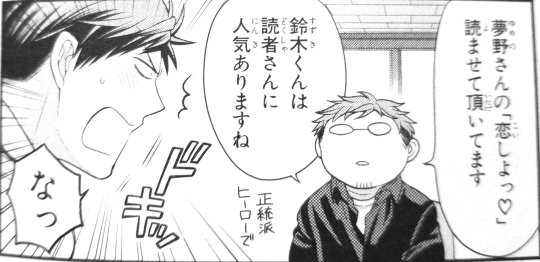
- 夢野さんの「恋しよっ♡」読ませて頂いてます
鈴木くんは読者さんに人気ありますね(正統派ヒーローで)
-(ドキッ)なっ
- Mr. Yumeno, I was given the opportunity to read your manga, Let's Fall in Love ♡. Suzuki certainly is popular among readers (As a standard hero)
- (Ba-bump) Wha--
(『月刊少女野崎くん』 Girl’s Monthly Nozaki-kun, vol. 4 by Izumi Tsubaki)
Causative + てしまう
While allowing and forcing are the two main uses of the causative form, there is one other usage: the responsibility usage, often indicated by its combination with the てしまう (to regretfully allow something to happen) grammar. This version expresses the guilt of the subject (who is usually the speaker, but not always) in not being able to stop a sequence of events from happening.(*) They let this happen, and it's all their fault.

おれが気づかなかったせいで59人も死なせてしまった
I let so many people die--fifty-nine people--all because I didn't notice.
(『不滅のあなたへ』 To Your Eternity, vol. 11, by Oima Yoshitoki)
J-Rock Examples:
完成させないでもっと良くして
Without finishing it, make it better
[宇多田ヒカル - 光]
このままじゃ終わらせないの
I won’t let it end like this!
[DOLL$BOXX – Take My Chance]
散った願いも/いつの日にか花を咲かせるだろう
Even scattered wishes / will probably make the flowers bloom someday.
[スキマスイッチ - 桜夜風]
アスファルトから出た芽が僕に知らせた。恋をしていた
The plants sprouting from the asphalt told me [made me aware] so. I was in love.
[HY - モノクロ]
震えるほどに 心躍らせたいの 始めようよ
[I] Want to make my heart pound so I shake Let’s begin
[Perfume - Spring of Life]
あなたを夢中にさせて
I’ll put you in a trance
[exist†trace - GINGER]
一人にさせない
Don’t leave me alone
(Lit: Do not make me into one person.)
[宇多田ヒカル - Prisoner of Love]
言葉なんか忘れさせて
Make me forget those words
目を閉じたまま踊らせて
Make me dance with my eyes still closed
[宇多田ヒカル - 忘却 featuring KOHH]
言葉にできない想いを/今宵は歌にして聴かせたい
Tonight, I want to let you hear the song / Made of the thoughts I can’t put into words
(Careful with this one–since there is no が・に to indicate whether the speaker or listener is allowed to hear, pay attention to the たい which clarifies it’s the speaker’s desire to permit. “I want you to let me” would be させてほしい or させて+くれたい・もらいたい, etc.)
[宇多田ヒカル - 荒野の狼]
いつでも皆を笑わせる
Always making everyone laugh
[水曜日のカンパネラ - 一休さん]
舞い上がる 愛を踊らせて
It lets love dance Soaring high
[X JAPAN - ENDLESS RAIN]
194 notes
·
View notes
Text
文法:〜される(受身形・Passive Tense)
Most sentences describing an action have two parts, the Doer of an action, and the Target. In most sentences, the Doer also happens to be the subject of a sentence, and the Target is the object. This is the active voice.
(私は)ケーキを食べました。
I ate the cake.
The passive tense occurs when a sentence is reordered so that the Target becomes the grammatical subject, and the verb "is done" to it by the Doer.
ケーキが(私に)食べられました。
The cake was eaten (by me).
Notice that cake changes from the subject particle を to the subject particle が (or topic particle は) . The original subject of the sentence, if it is mentioned, can be marked by に, から, or によって. The standard particle is に, but から can be used when there is no physical contact, or to avoid the confusion of using に too many times. It also only works when both the Target and Doer are people.. によって has a slightly more formal feel, and is used to describe creating or discovering something for the first time. (*, *, *)
Of course both Target and Doer may be omitted from the sentence, but it's best to keep the following structure in mind:
Target は・が Doer に (Passive Verb)

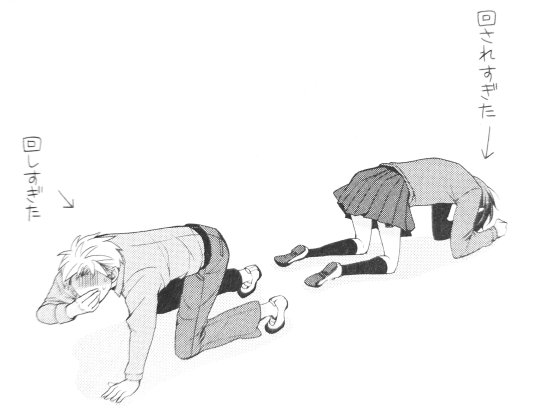
- 回しすぎた
【彼が彼女を回しすぎた】
- Too much spinning
【He spun her too much】
- 回されすぎた
【彼女が彼に回されすぎた】
- Spun around too much
【She was spun around by him too much】
(『月刊少女野崎くん』 Girl’s Monthly Nozaki-kun, vol. 1 by Izumi Tsubaki)
Passive Tense Conjugation
る verbs: Replace the る with られる
食べる → 食べられる
う verbs: Replace the -u sound with -aれる
買う → 買われる 読む → 読まれる
行く → 行かれる 急ぐ → 急がれる
立つ → 立たれる 死ぬ → 死なれる
帰る → 帰られる 遊ぶ → 遊ばれる
話す → 話される
Irregular verbs:
する → される
来る → こられる
Once in the passive tense, these verbs all conjugate as regular る verbs.
Notice the passive tense has a lot in common with the potential form, especially in the る-verbs. However, unlike the Potential form, you absolutely cannot get away with omitting the ら to make ら抜き言葉.

- 途中で眠くなって寝ちゃうかもしれんし
- たたき起こします
- たたかれます
- She may get sleepy on the way and fall asleep.
- Then I’ll hit her to wake her up.
- I’ll get hit.
(『よつばと!』 Yotsuba&!, vol. 9 by Azuma Kiyohoko)
Shifting Focus
The passive tense is most commonly used when you want to shift the focus on the Target of an action, rather than the Doer. Maybe the culprit is unknown, or you’re deliberately omitting the culprit... especially if you were to go out of your way to make an intransitive verb passive, then there certainly must be a culprit.
Passive tense also works for maintaining the natural subject of a sentence, often the speaker themselves, or to keep the same subject between the two parts of a compound sentence, even when they are the Target of an action.
While in English, the passive voice is often seen as unwieldy (and when writing an essay for class, you may be explicitly told to use the active voice), there are still times when it’s necessary in English too. As Stephen King once said, “An ax killed John” will never replace “John was killed with an ax.” When translating passive tense from Japanese into English, it’s important to keep in mind whether the passive voice would be natural or not for your translation.
In the following example, Nozaki is talking about his brother who remains the understood subject of the sentence in both clauses:

まぁ今のは冗談だけど昔は本当に喋らない奴でよくいじめられていてなぁ…
(何か言えよ− 無視してんじゃねぇよー)
Well now we joke about it, but long ago he really didn't talk, and (he) was often bullied for it…
(Say something! Don’t ignore us!)
(『月刊少女野崎くん』 Girl’s Monthly Nozaki-kun, vol. 4 by Izumi Tsubaki)
Additionally, there are two uses of the passive tense unique to Japanese that explain why it is such a common aspect of the language.
Politeness
The passive tense comes across as more indirect, and therefore more polite, so it is often used in more formal types of writing, like articles or academic journals, and sometimes polite speech as well.
Here in this example, the teacher's speech would normally be どうしたんですか, but as she's speaking to a parent of a student, she uses the passive tense as an added layer of formality, mirrored by the "father"/brother's speech ending with an unfinished て form and the use of the word 災難 rather than 大変. (The second 間違われた is passive tense used to shift the focus to the speaker's experience.)

- 一体どうされたんですか?
- いやあ 娘の様子を見てたら不審者に間違われて
- 災難でしたね
- What on earth happened?
- Oh, no, well, I was mistaken for a prowler while checking up on my daughter...
- How unfortunate!
(『不滅のあなたへ』 To Your Eternity, vol. 15, by Oima Yoshitoki)
Victimhood--Indirect Passive
This can be called the indirect passive, or even the adversative passive, and it's used to describe actions that don't directly happen to you, but still have an effect on you. They usually describe unpleasant or inconvenient situations. The Target is almost always the speaker as an understood subject, who has been made the victim--if they appear in the sentence, they'll be marked with は/が. The aggressor of the action will be marked with に, but in some cases the passive verb may be in this case an intransitive verb that might not normally take objects. If it is a transitive verb, the object may still be marked with を and remain unchanged from the normal, non-passive version of the sentences.
(私は)雨に降られたの。
I was rained on.
宿題を犬に食べられました。
The dog ate my homework.
(Notice since the victim in this sentence is you, homework maintains it’s object particle. In English, this one is more natural in the active voice.)
Here in this example, while She (Yotsuba) should grammatically be the subject and victim of the scolding, the reader so strongly identifies with Yotsuba that I feel the narration often edges toward the first person, emphasizing our connection to Yotsuba's victimhood.

おこられた
Got scolded.
(『よつばと!』 Yotsuba&!, vol. 1 by Azuma Kiyohoko)

- じゃあ(お言葉に甘えて)
- (どうしよう…そんな真剣に見られるなんて… 緊張してきた!!)あ…あの…
- Well then… (If you insist)
- (What do I do… Being stared at so intently like that… I’m getting nervous!!) U--um…
(『月刊少女野崎くん』 Girl’s Monthly Nozaki-kun, vol. 4 by Izumi Tsubaki)
Of course, you don’t always have to be on the receiving end of something terrible to use the passive voice!
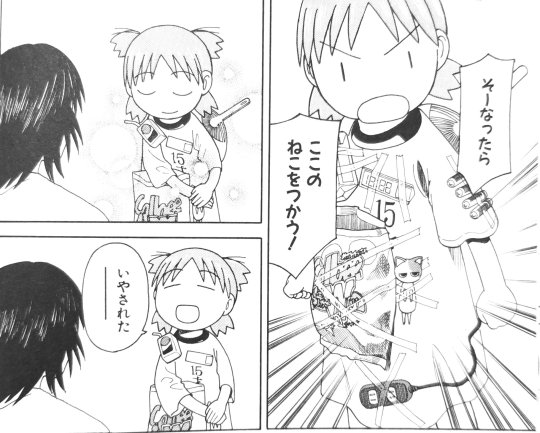
そーなったら ここのねこをつかう!
いやされたー
When I get like that, then I use this cat here!
I’m calmed...!
(『よつばと!』 Yotsuba&!, vol. 6 by Azuma Kiyohoko)
J-Rock Examples:
テンパって裏切られてもまだ/まるで諦めてないんだろ?
Even if I’m fed up and betrayed, / I haven’t completely given up yet, right?
[DOLL$BOXX – Take My Chance]
神聖な友を待たれよ
Wait for holy friends
朝日に 嘲笑われたって
Even if you were mocked by the morning sun
[赤い公園 - 交信]
運命さえ飲み込まれ沈みそうな海へと
Even fate has been swallowed up and will soon sink into the sea
[L’arc~en~Ciel - Daybreak’s Bell]
あなたに愛されたあの日から
Since that day I was loved by you
心を奪われたあの日から
Since that day my heart was stolen
[宇多田ヒカル - Prisoner of Love]
笑われては 笑い返して
If I’m laughed at, I laugh back
いつまで経っても 伸ばされない/ 腕を 待って
No matter how much time passes Wait / for the arm that won’t be reached out
染められちゃって
I am completely dyed
愛されたくて/ 愛せやしなくて
I want to be loved / I can never love
[関取花 - 東京]
翻弄されてる正体 耳元をかすかによぎる
My true form, being toyed with It passes by my ears faintly
[school food punishment - butterfly swimmer]
首輪つながれて生きるのはご免だね
I refuse to live with a collar (tied) around my neck
満たされぬ心だけ与えられたのは何故?
Why was I given only this heart that won’t be satisfied?
[宇多田ヒカル - 荒野の狼]
230 notes
·
View notes
Text
NEW ENGLISH UTADA HIKARU INTERVIEW ON DAZED
124 notes
·
View notes
Text
Languages I...
I was tagged by @chouhatsumimi, friend in real life and friend of the blog! It's been a while since I've been tagged for any sort of questions game mostly because I forget to do them haha So in the absence of any real blog updates (because seriously, undokai /and/ moving all in the same month?), here we go!
Languages I wish I could go back to studying:
I had a brief period in high school where I fancied myself an aspiring polyglot and overloaded my schedule with any language I had a spare hour for... Now that I have a better handle on Japanese kanji, I feel like Chinese doesn't seem so insurmountable. I really want to get back into Irish-Gaelic now that I don't have to rely on a teacher who only showed us movies about leprechauns. I feel like I got so good at just chattering in German even if I couldn't remember the proper gender to save my life. I regret dropping Arabic from my college freshman schedule, even though I did need to take that remedial college course... Probably the best language class I've ever had was an impromptu Taiwanese-dialect lesson from a very eager taxi driver... I wish I remembered more from that!
Languages I never ended up studying haven't really studied but would if I was a career polyglot getting paid to just exist:
I guess probably Arabic since I technically never even took the first class for that, haha. When we teach international greetings in 3rd/4th Grade 外国語活動 I always really liked Jambo best, so I think Swahili would be fun as well! Icelandic, Swedish (I only know mörklila is purple and that is already such a fantastic word), Russian...
Languages I am studying/have been studying:
Japanese Japanese Japanese Japanese Japanese 日本語 japanesE. I guess that's obvious though, haha. I finally reached the point where I've been studying it more than half my life. I never thought I'd get this far with it, and have it consume so much of my life, but all language learning dreams are possible with enough elbow grease!
My high school polyglot career ended when I decided to focus on my Japanese major in university, but I've recently been feeling the itch to tackle another language. I picked up Finnish on Duolingo recently and got a few levels in (kanpekibekki I have no friends yet friends plzzz), so we'll see how that goes!
And if anyone has a good third language rec for me, hit me up haha.
Languages I can’t touch for [insert reason]:
(This question is kind of weird, hey? I mean, I guess really none, but if I had to pick...)
Esperanto?? I dig the idea of an easy-to-learn language for people all over the world to give them all an equal footing (although Esperanto has a very decided western influence so kinda falls short), and I absolutely loved the teacher I had for my 2 semesters. But we hosted an Esperanto conference at our school and met other Esperanto speakers and... idk, it just wasn't for me. And there's something kind of sad about separating a language from a people and a culture, and having very little native media in that language... it's so sterile.
-----------------------------------------------------------------------------
Tagging........ no one specifically, because I'm a tumblr hermit I don't have anyone else to tag who hasn't been already, but I'd love to get to know some followers! If any of you would like to answer these questions, feel free to tag me so I can read your responses! ☆♪
1 note
·
View note
Photo

歌手: X Japan
アルバム: BLUE BLOOD
曲: ENDLESS RAIN
…………………………………注釈
Debuting first on their April 1989 album Blue Blood, then released as a single that same December, “Endless Rain” is still a powerful and beloved song even 32 years later, with YOSHIKI performing (socially-distanced) alongside artists like Sarah Brightman, BABYMETAL, and members of Queen for Japan’s 2020 New Year’s Eve music program, Kōhaku Uta Gassen.
At another recent television appearance, YOSHIKI said this about the song:
そして、視聴者に向けて言葉を寄せたYOSHIKI。「僕は『Endless Rain』とか『Imitation Rain』とか、『雨』の楽曲を書いているんですが、やはり、やまない雨はない、そして、明けない夜はない。みんなで協力し合って、一日でも早い夜明けが迎えられるように願っています」とメッセージを発信。
And Yoshiki offered some words for listeners. “I’ve written all these songs about ‘Rain’ like ‘Endless Rain’ and ‘Imitation Rain,’ but of course there is no rain with no end, and there is no night without a dawn. With everyone’s cooperation, I hope that we’ll be able to welcome the dawn even one day sooner,” he said.
--Yoshiki on “ENDLESS RAIN” in April, 2020
Despite the heavy lyrics of this song and many others, I feel underneath it also contains a glimmer of hope that is present throughout so much of their music. “Endless Rain” is just one of the many sides to the band X JAPAN.
“It still makes me cry every time, when the audience sing that song. It’s the first ballad I wrote. Before that, I was only writing heavy music and thrash metal. But when we signed to Sony Records, the producer said, ‘Can you just write one ballad? Could you try?’ I was like, ‘Okay, so here it is’ – and it just became a big hit. At the beginning, our fans were shocked, because X Japan are more known for a heavy style. But eventually they started liking it, and it became X Japan’s theme song.”
”The 10 best X Japan songs, as chosen by Yoshiki”
By Eleanor Goodman (Metal Hammer) November 08, 2017
Producer Tsuda Naoshi who helped direct the song, wrote up this in-depth analysis on the different parts that make the song a hit:
この曲はX JAPAN(当時はX)の初メジャーリリースアルバム「BLUE BLOOD」に収録されたバラードです。
先行してシングルカットされた当時のXの代表曲「紅」と共に、テレビなどのメディアを通してXというバンドの認知を広める大きなきっかけとなりました。
当時、僕はXのディレクターでした。
YOSHIKIという若いアーティストが、ゼロから名曲を生むことのできる「選ばれた才能」を持っていることに気づき、当時のXというバンドのイメージ、つまり
『見た目が派手でコアファンだけに人気の激しいメタルバンド』
というイメージとは全く違った、
『いずれ日本を代表するバンドとなり、世界中に伝わるような100年残る音楽を生み出すアーティスト』
となるはずだ、と信じ、エネルギーを込めてメンバーと共にアルバムを制作していました。
This song was the ballad included on BLUE BLOOD, the first major album released by X JAPAN (at the time, called X). Together with “Kurenai,” their signature song at the time which had been previously released as a single, “ENDLESS RAIN” was a major trigger for the band’s eventual fame, exposing many people to X through television and other media.
At the time, I was X’s director. I noticed the young artist Yoshiki was blessed with the “chosen talent,” the ability to birth a popular song from nothing. I realized that the image back then of the band X, as a extreme, gaudy metal band that could only appeal to their core fans--that image was all wrong. That in fact they were destined to become artists who would eventually form one of Japan’s representative bands and birth music that would live on for a hundred years, spanning across the globe.
I believed this, and together with the band members poured my energy into developing their album.
[...]
では「ENDLESS RAIN」のサビのメロディーを見てみましょう。
メロディーは、「ミ」を3拍伸ばした後、「シ」に上がって1拍、そしてに「ド」へ上がり、また3拍伸ばします。
とてもシンプルで大きなメロディーですね。
にもかかわらず、下降進行の和声と相まって、とても胸に響きます。
もちろん、あえて分析をすれば、明るいCの和声で「ミ」が始まり、和声が下がる中メロディーが逆に「シ」と上へ上がり、「ド」へ辿り着いた時に、和声は暗めのAmに落ち着く・・・ので、胸に響く。
とも解釈できますが、これは美味しい料理を分子レベルで分析したり、恋している好きな人のことを細胞やDNAで分析するのと同じで、大した意味はありません。
それよりも、人の心を打つ曲をゼロから生むことのできる作曲家の「心」に注目した方が良いでしょう。
Next, let’s look at the melody of the chorus in “ENDLESS RAIN.”
The melody, after holding Mi for three beats, rises to Ti for one beat, then again to Do for another three beats. It’s a very simple and grand melody. Nevertheless, coupled with the downward chord progression of the harmony, it reverberates through the heart.
Of course, if you were to insist on analyzing it, the Mi begins with the bright C of the harmony, then right when the harmony descends, the melody conversely rises up to Ti, and when we finally arrive at Do the harmony also settles at the dark A minor and… thus it reverberates through the heart. Certainly we can analyze it, but this is no different than analyzing a delicious meal at the molecular level, or the cells and DNA of your beloved; it holds no considerable meaning.
More than that, it’s best to focus on the “Heart” of the composer who can birth a song from nothing that touches people’s hearts.
このサビのメロディー、「ミ」を3拍「シ」を1拍、「ド」を3拍 と同じようにとてもシンプルな、誰でも知っている、あるパッセージと比べると、名曲の深淵が見えてきます。
その例は、小学校の授業などで始まりの際にお辞儀をする、あれです。
「ド」を2拍「シ」を2拍「ド」を3拍。
このパッセージを聴きながらお辞儀をする際に、果たして人々は深く感動するでしょうか。
「お辞儀の伴奏」と同じくらいにシンプルなのにも関わらず、「ENDLESS RAIN」のサビが聴く人の心を打つのは、作曲したYOSHIKIの心の震えや感情が、そのまま音になっているからです。
When compared to a certain passage that everyone knows, that is very simple--just like the hook of this melody (three beats of Mi, one beat of Ti, and three beats of Do)--the abyss of the masterpiece can be seen. That example is the melody played whenever everyone bows at the beginning of elementary school classes and such. Two beats of Do, two of Ti, and 3 of Do. Sure enough, aren’t people deeply moved whenever they bow while hearing this tune?
Despite being as simple as the accompaniment for bowing at ceremonies, the hook of “ENDLESS RAIN” touches people’s hearts because the emotions and flutter of the heart of the composer YOSHIKI are birthed into music unchanged.
津田直士「名曲の理由」File01. X JAPAN「ENDLESS RAIN」前編
“The Reasons for a Masterpiece” File01. X JAPAN’s “ENDLESS RAIN” pt. 1 by Tsuda Naoshi
(ライブ→)
(音楽→)
(歌詞→)
(英訳→)
3 notes
·
View notes
Photo

歌手: X Japan
アルバム: BLUE BLOOD
曲: ENDLESS RAIN
…………………………………英訳
I'm walking in the rain
行く(あてもなく) (傷ついた体)濡らし
絡みつく 凍りのざわめき
殺し続けて 彷徨う (いつまでも)
Until I can forget your love
I’m walking in the rain
With nowhere to go My wounded body is soaked
The crackle of ice Entangles me
Continuing to kill I wander forever,
Until I can forget your love
眠りは麻薬
(途方にくれた 心)を(静かに)溶かす
舞い上がる 愛を(踊らせて)
(ふるえる身体)を 記憶の薔薇につつむ
I keep my love for you to myself
Sleep is a drug
It gently melts the puzzled heart
It lets love dance Soaring high
And wraps my trembling body in memory’s roses
I keep my love for you to myself
※ Endless rain, fall on my heart 心の傷に
Let me forget all of the hate, all of the sadness ※
※ Endless rain, fall on my heart into the wounds of my heart
Let me forget all of the hate, all of the sadness ※
Days of joy, days of sadness slowly pass me by
As I try to hold you, you are vanishing before me
You're just an illusion
When I'm awaken, my tears have dried
in the sand of sleep
I'm a rose blooming in the desert
It's a dream, I'm in love with you
まどろみ抱きしめて
It's a dream, I'm in love with you
Embrace slumber
(※ Repeat ※)
I awake from my dream
I can't find my way without you
The dream is over
(声にならない) 言葉を(繰り返しても)
(高すぎる)灰色の壁は
(過ぎ去った日)の思いを夢に写す
Until I can forget your love
The dream is over
Even though I repeat the words They won’t escape my lips
The ashen wall that towers too high
Reflects in my dreams the memories of days long gone
Until I can forget your love
(※ Repeat ※)
Endless rain, let me stay evermore in your heart
Let my heart take in your tears take in your memories
(※ Repeat ※)
Endless rain
(ライブ→)
(音楽→)
(歌詞→)
0 notes
Text
文法:〜すぎる(Too ~)
すぎる is a verb suffix that expresses an excess of something, either you did too much of an activity, or it has too much of a certain quality. While originally it implied a slightly negative meaning, it is now frequently used with positive situations as well.
(Verb stem) + すぎる
(い-adj)い + すぎる
*いい → よ + すぎる
(な-adj) + すぎる
* As always, いい changes back to よい when conjugated.
すぎる is a る-verb, and conjugates with the rest of the sentence.
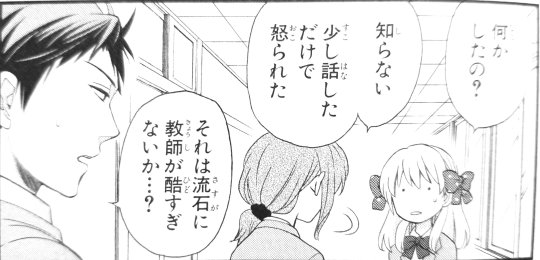
- 何かしたの?
- 知らない 少し話しただけで怒られた
- それは流石に教師が酷すぎないか…?
- Did you do something [to make the teachers chase you]?
- I don't know. I just talked to them a bit, and then they got mad at me.
- That's certainly too harsh for a teacher, isn't it...?

- ……って 私 完璧すぎない!?(ちょーいい女!!!)
- おまえ本当にわざとじゃないのか!!?
- ... which means, I'm just way too perfect, right?! (I'm like the perfect woman!!!)
- You really aren't doing all that on purpose?!!
(『月刊少女野崎くん』 Girl’s Monthly Nozaki-kun, vol. 1 by Izumi Tsubaki)
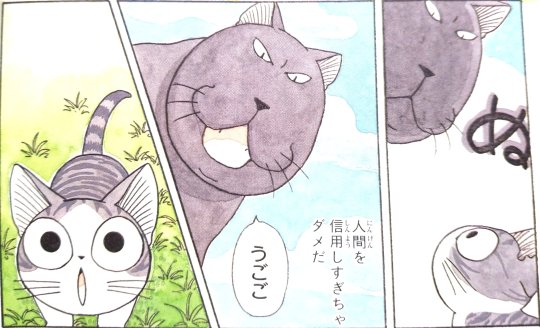
(ぬ)
うごご【人間を信用しすぎちゃダメだ】
(Loom) Mrrow 【You shouldn't trust humans too much】
(『チーズスイートホーム』Chi's Sweet Home, vol. 1 by Konami Kanata)
This grammar comes from the verb 過ぎる meaning “to exceed,” but is most commonly written in hiragana.
*ない Endings
Negative Adjectives
Things get a little tricky when dealing with ない. The Negative −ない ending on adjectives changes the final い to さ before attaching すぎる (very similar to how そうな combines with the negative, although mysteriously we don’t say よさすぎる).
(い-Adj)くない + さ + すぎる
(な-Adj)じゃない + さ + すぎる
美味しくない → 美味しくなさすぎる “too unappetizing”
静かじゃない → 静かじゃなさすぎる “too noisy”
Of course, like in the second example, in English it’s probably more natural to just use a word of the opposite meaning rather than negating it.
However, some い-adjectives end in ない, and come in two varieties: those which are made up of the combo of a noun and the negative ない, and those which just coincidentally end in ない.
“Noun + Negative ない” Adjectives
Originally these adjectives were phrases like もったいがない or 頼りがない. As a result, they conjugate the same as the negative endings above, with the final い turning into さ.
もったいない → もったいなさすぎる “too wasteful”
だらしない → だらしなさすぎる “too sloppy”
頼りない → 頼りなさすぎる “too unreliable”
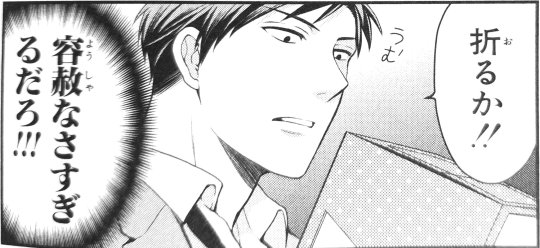
- 折るか!!(うむ)
- 容赦なさすぎるだろ!!!
- I’ll break it off!! (Hmph)
- Isn’t that way too merciless!!!
(『月刊少女野崎くん』 Girl’s Monthly Nozaki-kun, vol. 2 by Izumi Tsubaki)
“Coincidental ない” Adjectives
These adjectives have nothing to do with the negative ある, but just happen to have the pronunciation ない at the end. You can see how the な in 汚い is even included in the kanji, though not all examples follow that pattern. While easily mistaken for the above group, they are supposed to conjugate like normal い-adjectives by dropping the final い.
汚い → 汚すぎる “too messy”
少ない → 少なすぎる “too few”
危ない → 危なすぎる “too dangerous”
Negative Verbs
Surprisingly, the negative tense of verbs is *not* supposed to take さ when combining with すぎる. However, things tend to kind of get murky with the rules, so it’s becoming more and more acceptable to add さ in conversational use. Shorter verbs especially, like する and 見る, feel too short without that extra さ, and so almost always include it.
(Verb)ない + すぎる
↳(Verb)ない + さ + すぎる
知らない → 知らなすぎる “to know too little”
→ 知らなさすぎる (*incorrect but okay)
見ない → 見なさすぎる “to see too little”
(Cheers to Maggie-sensei for such an in-depth explanation on something even a lot of Japanese tend to confuse.)
Noun Form: 〜すぎだ
すぎる also has a noun form, すぎだ. When used as a verb, すぎる focuses more on the action, while as a noun すぎだ focuses more on the state. While in many instances they can be interchangeable, すぎだ is more natural when talking about habitual actions, or someone’s current state--you won’t see すぎだった used for one-off past actions. You’ll see it very commonly as a casual exclamation.
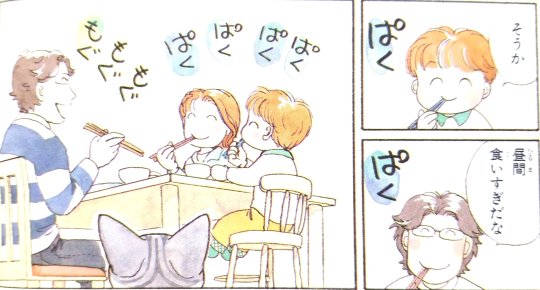
−そうか
−昼間食いすぎだな
(ぱくぱく もぐもぐ)
- Oh really
- Chi eats too much during the day, huh
(Munch munch chew chew)
(『チーズスイートホーム』Chi's Sweet Home, vol. 1 by Konami Kanata)
J-Rock Examples:
先読みのし過ぎなんて意味の無いことは止めて
Stop these meaningless things like reading too much into the future
[宇多田ヒカル ‐ 光]
切なすぎる 切なすぎる 思い伝えたら
Too painful Too painful When I share these thoughts
愛しすぎた 愛しすぎた 僕が分かるはず
Loved too much Loved too much I should understand
眩しすぎる 眩しすぎる 時を
Too dazzling Too dazzling This moment
[LUNA SEA - BELIEVE]
高すぎる灰色の壁は
The ashen wall that towers too high
[X JAPAN - ENDLESS RAIN]
67 notes
·
View notes
Text
文法:〜に/く なる (Become ~)
(Noun) + に + なる
(な-Adj) + に + なる
(い-Adj) い + く + なる
Become 〜
This structure combines the adverbial form of an adjective or noun with the verb なる. Remember that adjectives will not take their final な or い in this form. With this form, something is "becoming 〜", rather than "being 〜" as we see when using く/に+する.
The verb なる can be conjugated into just about any form. You may often see it used with the grammar てくる・ていく which also naturally expresses a change.

あなるはとってもオシャレになって
ぽっぽはすっごく大きくなって
じんたんはいっぱい髪のびたけど
Anaru has become so stylish, Poppo has grown huge, and Jintan's hair grew so long, but...
(『あの日見た花の名前を僕達はまだ知らない。』 Anohana: The Flower We Saw That Day, vol. 1 by Okada Mari and Izumi Mitsu)

(ボーゼン)チー大丈夫そうだけど……
ますますお風呂がきらいになったかしら(はー)
(Dazed) Chi looks all right, but...
I wonder if she's grown to hate baths even more (Sigh)
(『チーズスイートホーム』Chi's Sweet Home, vol. 1 by Konami Kanata)
Verbs typically require a more complex form to describe change, like てくる・ていく or ようになる, but the negative ending 〜ない works like an い-adjective, and can be used with 〜なる as well. Don't forget that adjectives also have ない endings in the negative tense as well!
(Noun)じゃない + く + なる
(な-Adj)じゃない + く + なる
(い-Adj)くない + く + なる
(Verb)ない + く + なる
Become not 〜

- つっかえて動かなくなっちゃったんです…
引っぱってもらえませんか?
- あーー…
- I got stuck and became completely unable to move... Could you pull me out?
- Ahh...
(『よつばと!』 Yotsuba&!, vol. 1 by Azuma Kiyohoko)
J-Rock Examples:
開かなくなったかい
Did it close up?
Lit: Became not open, simplified to “close up” here.
[ 赤い公園 - 交信]
強がりや欲張りが無意味になりました
Bluffs and greed became meaningless
[宇多田ヒカル - Prisoner of Love]
ぐちゃぐちゃになって/ 抜け出せなくなって
I become sloppy / It’s gotten so I can not break away
[関取花 - 東京]
灰になってしまっちゃいたい あの日の小さな恋ごと
灰になってしまっちゃいたい ふたりで
I want to burn to ashes All the little romances from that day
I want to burn to ashes Together
流れ星になる
(They/We) become shooting stars
[関取花 - 流れ星]
僕は空気になりたい なって君と混ざりたい
I want to turn to air Become air, and join with you
僕は空気になりたい なって君を見つめたい
I want to turn to air Become air, and gaze upon you
流線型になって 泳ぐように歩く
I become streamlined I walk like I’m swimming
心配になるくらいの 早鐘と頬の色
The worrisome alarm bells and the color in my cheeks
僕は空気になりたい なって君をさらいたい
I want to turn to air Become air, and sweep you away
今なら何もかも失くして 君とふたりっきりになったって構わないよ
If right now I lost everything leaving just the two of us, I wouldn’t mind
[school food punishment - butterfly swimmer]
途中気分の悪くなった方は我慢をしないで早めにコールミー
Those who get sick en route, don’t hesitate and right away call me
[水曜日のカンパネラ - ジャンダルク]
アイツがそのうち大人になったら
パンクな破戒僧になりそう
Sooner or later when he grows up (/becomes an adult),
That guy’s gonna be some fallen priest punk
[水曜日のカンパネラ - 一休さん]
声にならない 言葉を繰り返しても
Even though I repeat the words They won’t escape my lips
[X JAPAN - ENDLESS RAIN]
33 notes
·
View notes
Text
文法:名詞修飾(Modifying Nouns)
Adjectives are easy to use to describe (or modify) nouns in Japanese--simply just plop them in front of a noun in whatever tense you choose. Nouns can too, if you just add the particle の.
美味しいケーキはあそこです。
The delicious cake is over there.
美味しくないケーキを食べたくない。
I don't want to eat a cake that's not delicious.
スーパーのケーキは美味しくない。
The supermarket’s cake is not very delicious.
Turns out it’s just as easy to do with verbs and longer clauses as well! While in English there are so many rules about whether you use “who” or “that” or “which” and whether it comes before the noun being described or after and all those complicated names like relative clauses or present participles... but in Japanese, just about any verb or sentence can be placed before a noun as long as it’s in plain form--even in the most formal of situations, this is going to stay in the short form. And you can move it around to be just about anywhere in a sentence...
昨日食べたケーキは美味しくなかった…
The cake I ate yesterday was not delicious...
そのスーパーから昨日食べたケーキを買ったよ。
I bought the cake we ate yesterday from that supermarket.
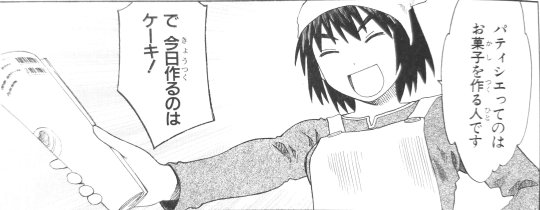
パティシエってのはお菓子を作る人です
で 今日作るのはケーキ!
A patisserie is a person who makes sweets.
So, what we'll be making today is cake!
(『よつばと!』 Yotsuba&!, vol. 7 by Azuma Kiyohoko)
As you can see in this example, this grammar is also the basis for the の・こと Verb Nominalization grammar.
There are a few points you should watch out for:
Avoid the particle は
If it were to be used within the clause describing the noun, は would muddy up the meaning of the sentence, leading your listeners to think it’s part of the overall sentence structure. Compare:
母は作ったケーキを食べた
My mother ate the cake (I) made.
母が作ったケーキを食べた
(I) ate the cake my mother made.
が can be replaced with の... most of the time.
Since nouns describing other nouns use の, the nouns in the clauses describing nouns can also be used with の to just make a noun chain, but with some other words in between. The meaning is essentially the same.

冷蔵庫の奥で 見覚えのない食べ物を発見した
In the back of my fridge I discovered some food I didn't recognize
(『月刊少女野崎くん』 Girl's Monthly Nozaki-kun, Vol. 3 by Tsubaki Izumi)
However there are some times when the use of の would, like は, muddy the meaning. If the clause is too long, it’s more natural to use が. Or sometimes you already used の once and it’s just way too many の’s.
母が作ったケーキ = 母の作ったケーキ
The cake my mother made
✕ 昨日母の米とベーコンで作ったケーキ(too long, easily mistaken for “mother’s rice” and not “cake made by mother”)
✕ 母の作ったケーキのレシピのカード(Too many の, it’s just tacky)

君のことが書かれている本を借りてきたよ!
きみは大木から目覚めた伝説の不死者 神の使い フシ そうだね!?
I've borrowed a book where there's stuff written about you!
You're the legendary immortal who awoke from the great tree, the messenger of the gods, Fushi, right?!
(『不滅のあなたへ』 To Your Eternity, vol. 13, by Oima Yoshitoki)
More reading and examples that aren’t so heavily cake-based at Tofugu, Wasabi Japanese, and as always, Maggie-sensei.
J-Rock Examples:
君という光が私を見つける
The light called you finds me
[宇多田ヒカル - 光]
吹き抜ける桜夜風
The cherry blossom night wind that blows through
[スキマスイッチ - 桜夜風]
(願いは)無数の波を超え明日へ立ち向かう貴方を/守りたまえ
(My wishes) Cross countless waves, and please protect you, / Who stands against tomorrow
[L’arc~en~Ciel - Daybreak’s Bell]
少しの隙間から見えた 君の一瞬を記憶する才能
The ability to remember the moments of you, visible through a few cracks
[school food punishment - butterfly swimmer]
まずは仲間になんでも相談する男
カッコいいと思ってタバコ吸う女の子
The man, who first asks his friends everything
The girl, smoking tobacco and thinking it’s cool
永遠の始まりに背を向ける 私たち
The two of us, who turn our backs on the beginning of forever
[宇多田ヒカル - 荒野の狼]
傷ついた体濡らし
My wounded body is soaked
途方にくれた 心を静かに溶かす
It gently melts the puzzled heart
ふるえる身体を 記憶の薔薇につつむ
And wraps my trembling body in memory’s roses
過ぎ去った日の思いを夢に写す
Reflects in my dreams the memories of days long gone
[X JAPAN - ENDLESS RAIN]
79 notes
·
View notes
Text
文法:Adjectives → Adverbs
Adjectives are words that describe nouns. Adverbs describe other types of words: verbs more commonly, adjectives, other adverbs, and even whole sentences. They answer the questions how?, how much?, in what way?, when?, and where?
If you have trouble recognizing adverbs, remember in English, we often recognize adverbs by the addition of the suffix -ly to an adjective (quickly, loudly, slowly, elegantly, really), although many adverbs also don’t fall into this pattern (like "quite" and "very" which don't have adjective forms, or like "fast" which is identical to its adjective form).
In Japanese, it’s even easier to change adjectives into adverbs. Just add く to the stem of any い-Adj, and に to the stem of any な-Adj. Remember though, not all adverbs come from adjectives (think とても, きっと, etc.) or some that do not change at all when turned into adverbs (大変).
(な-Adj)な + に
(い-Adj)い + く
はやい → はやく
Quick, early → Quickly, early
しずか(な) → しずかに
Quiet → Quietly
You might even recognize the adverbial form of いい (good), which is よく (well). Remember that いい is an irregular い-adjective, and only ever conjugates in its alternate form, よい.
いい → よい → よく
Good → Good → Well
Keep in mind that as Japanese is an entirely different language, you may see some words being used in ways that are unnatural in English.
美味しく食べよう!
Eat deliciously → Let’s enjoy eating!
This is a rather simple grammar, but you’ll see it used as a building block for all sorts of other grammar forms, so it’s a good trick to always keep in your back pocket.
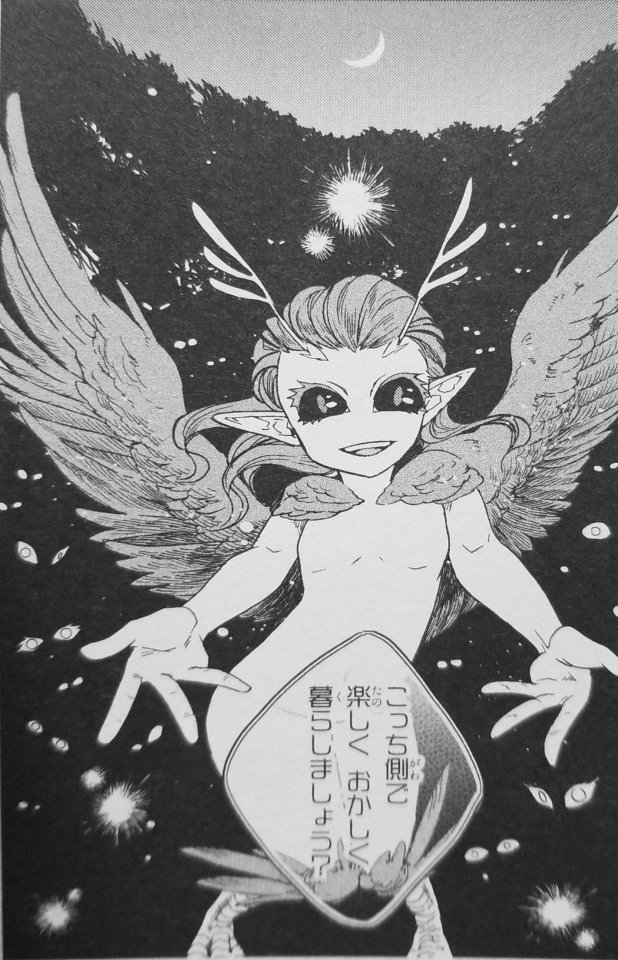
こっち側で 楽しく おかしく暮らしましょう?
Why don’t you live a fun and strange life on our side?
(Lit: funly, strangely)
(『魔法使いの嫁』 The Ancient Magus' Bride, vol. 1 by Yamazaki Kore)
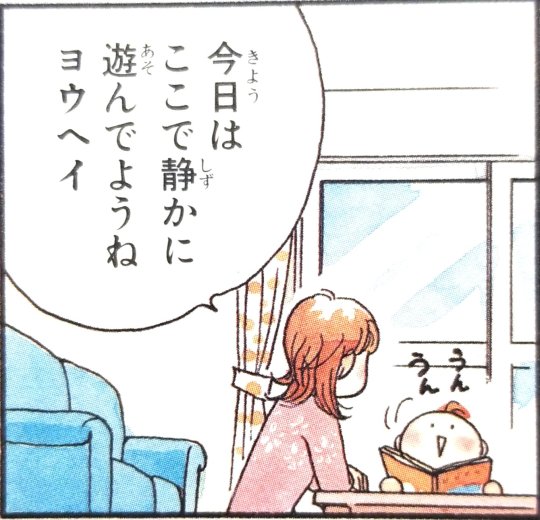
今日はここで静かにあそんでようね ヨウヘイ(うんうん)
Today, let's play here quietly, okay Yohei? (OK OK)

ふみふみして おでこおしつけて寝た
なんだか チーにすごく好かれてる気がするなー(はっはっは)
She kneaded, then fell asleep with her head resting on my stomach
Somehow, I feel immensely loved by Chi! (Hahaha)
(『チーズスイートホーム』Chi's Sweet Home, vol. 1 by Konami Kanata)
J-Rock Examples:
静かに出口に立って
Quietly, stand in the exit
きっとうまくいくよ
It will surely go well!
[宇多田ヒカル - 光]
そう簡単にいかないな…かな
It can’t happen that easily… can it?
豪快に放つヒッカケだ もう一回
A pull that is boldly released, one more time
[DOLL$BOXX - Take My Chance]
水溜り越えあてもなく
and cross puddles, aimlessly
躓きながらあてもなく
While I stumble around aimlessly
春はもうそこに静かに待つ
Spring is already waiting quietly there
時は遥かに風が優しく/涙を美空へ拭い去る
In time, the wind more gently / dries off your tears far into the beautiful sky
[スキマスイッチ - 桜夜風]
あんなに簡単に消えてしまった過去の痛み
That simply the ache of the past disappeared completely
[HY - モノクロ]
退屈な毎日が急に輝きだした
The boring everyday suddenly started to shine
Oh 見捨てない 絶対に
Oh I won’t fail Definitely
より一層強く惹かれ合う
They are attracted to each other even more strongly
ありふれた日常が急に輝きだした
The trite and ordinary suddenly started to shine
[宇多田ヒカル - Prisoner of Love]
父は言った「お前らしく」
Dad said, “That’s just like you”
[関取花 - 東京]
あのリズムを奏でては列車中に空しく響く
tap out that rhythm, it echoes through the train in vain
[関取花 - 石段のワルツ]
耳元をかすかによぎる
It passes by my ears faintly
フルに使って夢で再生する
I will use it to the utmost and play them back in a dream
[School Food Punishment - Butterfly Swimmer]
途中気分の悪くなった方は我慢をしないで早めにコールミー
Those who get sick en route, don’t hesitate and right away call me
生活のために始めたバイトは適当に決めたバスガイド
The job I started for my new life, I randomly decided on bus guide
[水曜日のカンパネラ - ジャンダルク]
止めどなく雪崩れる
An endless avalanche
[赤い公園 - 今更]
沈みゆく太陽の10倍も速く/…走ってった
(Running ...) Ten times faster than the sinking sun
[水曜日のカンパネラ - メロス]
行くあてもなく
With nowhere to go
途方にくれた 心を静かに溶かす
It gently melts the puzzled heart
[X JAPAN - ENDLESS RAIN]
77 notes
·
View notes
Photo
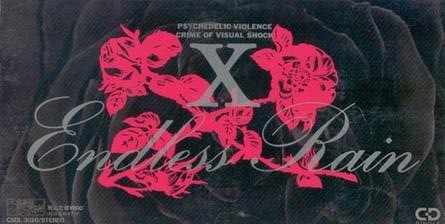
歌手: X Japan
アルバム: BLUE BLOOD
曲: ENDLESS RAIN
…………………………………歌詞
I'm walking in the rain
行くあてもなく 傷ついた体濡らし
絡みつく 凍りのざわめき
殺し続けて 彷徨う いつまでも
Until I can forget your love
眠りは麻薬
途方にくれた 心を静かに溶かす
舞い上がる 愛を踊らせて
ふるえる身体を 記憶の薔薇につつむ
I keep my love for you to myself
※ Endless rain, fall on my heart 心の傷に
Let me forget all of the hate, all of the sadness ※
Days of joy, days of sadness slowly pass me by
As I try to hold you, you are vanishing before me
You're just an illusion
When I'm awaken, my tears have dried
in the sand of sleep
I'm a rose blooming in the desert
It's a dream, I'm in love with you
まどろみ抱きしめて
(※くり返し)
I awake from my dream
I can't find my way without you
The dream is over
声にならない 言葉を繰り返しても
高すぎる灰色の壁は
過ぎ去った日の思いを夢に写す
Until I can forget your love
(※くり返し)
Endless rain, let me stay evermore in your heart
Let my heart take in your tears take in your memories
(※くり返し)
Endless rain
(ライブ→)
(音楽→)
0 notes
Video
youtube
歌手: X Japan
アルバム: BLUE BLOOD
曲: ENDLESS RAIN
…………………………………MV
X Japan Interview with Yukinobu Hasegawa in Rockin'f vol. 170 (Dec. 1989)
---「Endless Rain」のプロモーション・ビデオをとったけど、どんな内容に仕上がってる?
--- You recently finished filming the music video for “ENDLESS RAIN.” How did it turn out?
TAIJI:なんだ、まだ見てないの?あれは夢だね・・・(一同大爆笑)。
What, you haven’t seen it yet? It must’ve all been a dream… (Everyone bursts into laughter)
PATA:夢ときたか。じゃあ、あれは希望だね。
A dream, huh. Then that is our wish.
HIDE:それじゃ、旅立ちかな(笑)。まるで卒業文集だな~。でも、あのビデオは、いわゆるバラード・ナンバーのビデオのでも王道をいってる。自分でも、すごい感動した。
Well maybe it was a start to a journey (laughs). As if it’s a graduation album, yeah? But, that video, it was what you would call pretty standard for a ballad. Even I was super impressed.
PATA:泣いてもらいましょうか。
Won’t you cry for us?
TOSHI:映像も結構きれいでね。TAIJIがね、雨の中で泣いてんの。
The filming is also quite beautiful. You know, Taiji was crying in all of that rain.
TAIJI:なんだよ~(笑)。でも、外国のプロモーション・ビデオみたいにカッコいいよ。
What’re you talking about? (laughs) But, it was as cool as a Western music video.
YOSHIKI:なんか、カッコよく出来すぎちゃってる。ヤバイよ(笑)。
It was almost too cool. It’s insane (laughs).
HIDE:JARO(公共広告センター)って感じ。
It felt like something JARO would make (i.e., inoffensive and palatable to the masses).
ヨシキ YOSHIKI (Dr&Pi)
トシ ToshI (Vo)
ヒデ HIDE (Gt)
パタ PATA (Gt)
ヒース HEATH (Ba)
スギゾー SUGIZO (Gt&Vn)
タイジ TAIJI (Ba)
(ライブ→)
24 notes
·
View notes
Text
youtube
歌手: X Japan
アルバム: BLUE BLOOD
曲: ENDLESS RAIN
…………………………………ライブ
「ENDLESS RAIN」は、X(後のX JAPAN)が1989年12月1日にリリースした4作目(メジャー2作目)のシングル。
前作「紅」に続き、メジャー・デビュー・アルバム『BLUE BLOOD』からのリカット・シングル。
X初のメジャーバラード。インディーズ時代にもバラード曲は存在しているが、メジャーキー(長調)展開は初。
ライブではほぼ必ず演奏され、ファンとの合唱が行われる。
ギターソロは、HIDEが作曲した。
初期にNHKの番組でこの楽曲を披露する際、「眠りは麻薬」の「麻薬」の部分は放送禁止用語にあたるため、「眠りは深く」と歌われていた。
『THE LAST LIVE〜最後の夜〜』は、日本のロックバンドX JAPANが1997年の12月31日に東京ドームで行った解散コンサート。
解散するにあたりYOSHIKIとTOSHIに確執が生まれていた。
それに、HIDEとの最後のライブ。
「ENDLESS RAIN」は2回目のアンコールの曲として演奏された。
“ENDLESS RAIN” is the 4th single (2nd since they joined a major record label) of the band X JAPAN (formerly called X). It was released on December 1st, 1989. Following the previously released “Kurenai,” the single was released after its inclusion on their major debut album, Blue Blood.
It was the first major ballad for X. While they had several ballads during their indie period, this was the first to be developed in a major key. It is almost always performed at concerts, where fans join in to sing the chorus. The guitar solo was written by HIDE.
In the early days, because the word mayaku (drug) was banned on television broadcasts, when this song was performed on NHK programs, the lyric “Nemuri wa mayaku (Sleep is a drug)” was sung as “Nemuri wa fukaku (Sleeping deeply).”
THE LAST LIVE: Last Night is X Japan's final concert before they disbanded, on December 31st, 1997 at Tokyo Dome. There was a lot of strife at the time between YOSHIKI and ToshI over the dissolution of the band. It was also the final performance with HIDE before the guitarist's death. "Endless Rain" was performed as part of the second encore.
(★, ☆, *)
ヨシキ YOSHIKI (Dr&Pi)
トシ ToshI (Vo)
ヒデ HIDE (Gt)
パタ PATA (Gt)
ヒース HEATH (Ba)
スギゾー SUGIZO (Gt&Vn)
タイジ TAIJI (Ba)
2 notes
·
View notes
Photo

歌手: Syrup16g
アルバム: Mouth To Mouse
曲: パープルムカデ
翻訳者: Kenji
…………………………………注釈
TW: Bugs(泣)
Mukade are giant, venomous Japanese centipedes, one of the most feared bugs of Japan. They like to hide in bed sheets and futons, or as I’ve often found them, around sinks or bath areas. Their bites are painful, so it’s best to consult a doctor if you’re ever bitten.
One bit of mukade lore is that they’re always found in 夫婦 pairs--husband and wife. So if you find one, you should probably keep an eye out for the other...!
This is my preferred brand of mukade traps:

But mukade are so detested that many people often complain about the packaging having pictures of mukade on them. “I’m buying this so that I never have to see a mukade again, so why are they making me look at a picture of one?” Online, even the word itself may be censored as if it is some terrible taboo word: ム◯デ、ムカ◯、 ◯カデ... The word for cockroach is often written similarly (ゴ◯ブリ), though surprisingly not the dreaded suzumebachi hornet.
--
But the mukade in this song are not literal. Syrup16g guitarist and songwriter Igarashi Takashi has described it in multiple interviews as a metaphor for fallen soldiers on a battlefield. Released in 2003, the same year as the Iraq War, it seems to be in response to Japan’s promise to contribute members of its self defense force despite promises to avoid engaging in combat. But Igarashi remains noncommital on the true message of the song. Below are some of his comments from a 2003 interview in the magazine SNOOZER with interviewer Tanaka Soichiro:
「『パープルムカデ』っていうのは、星条旗の青が、ドーンと田舎かどっかでまき散らされて、その中で、ドロドロの血の中で紫色になって。そういうイメージが。その中で、兵隊がムカデ、あるいは、うごめいているみたいな世界と、今、ここで、取材を受けて、のほほんとコーヒーを飲んでいる自分の感覚というか」
“‘Purple Mukade’ is kind of like this image of American troops scattered with a bang in the middle of nowhere with the blue of the American flag, and in the middle of that, mixing with the sticky blood they turn purple. In all of that, the soldiers are the centipede. Or, as I sit here now at this interview, drinking coffee without a care, I get the feeling that perhaps it’s the world that’s wriggling like a bug.”
「反戦ではないんですよね。反戦的な歌だと、インタヴューで言われることもありましたけど。でも、戦争は悲惨だから同情しなきゃとか、そういう感覚にいないというか。」
“It’s not anti-war. I’ve said in interviews before that it’s an anti-war song. But really there is no sense that we must pity them because war is a tragedy.”
「普通に好きなことを考えて、好きな女の子のことを考えて生きていける世の中に生まれるはずだったのに、自爆テロをしなきゃいけなかった青年というのは、どういう気持ちなんだろうとか、そういうことを考えたり。想像もつかないんですけどね。自分が、ロックなんてものを、安全な商品化されたものをやっている後ろめたさみたいなものから、もしかしたら離れたかったのかもしれないですよね。それを想像することによって」
“I wonder things like how these young guys who had to become suicide bombers must have felt, even though they were supposed to be born into a world where they can live and think about the ordinary things that they like, think about the girl that they like. You can’t even imagine it, you know. Myself, I feel guilty for doing things so safely commercialized like playing in a rock band, so possibly I wanted to distance myself from that by imagining that kind of other life.”
Even as a rare Syrup16g song that’s about something other than ordinary life, Igarashi still manages to write a song that’s centered on himself, and the discomfort of feeling safe while so many others in the world are going through so much horrendous suffering.
--
In a lighter interpretation, drummer Nakahata Daiki recounts another possible origin for the song’s mukade in a review for 「パープルむかで」posted on the band’s site:
16年前のある朝、
ツアー先のホテルのベッドの中で何かがモゾモゾと体に触る感触で目を覚ましました。
恐る恐る布団をはいでみるとそこには毛だらけの大きな虫が這っていたんです。。。!
ぞっとするよね。。。どんな虫だったか名前も知らないけども。
そのホテルにクレームを言う訳でもなくメンバーにそっと朝のさわやかな話題として提供しました。
One morning, 16 years ago,
In a hotel bed while on tour, I woke up to the feeling of something creeping along my skin.
When I fearfully tore off the blankets, there was a large, hairy bug crawling around...!
It makes my skin crawl... I don’t even know the name of what kind of bug it was.
That morning I quietly told the other band members, not as a complaint so we could seek compensation from the hotel, but as a fresh topic of conversation.
「パープルムカデ」のレビューを書くにあたり
久々に聴き返していたらそんな事があったなぁなんて思い出しました。
レビューというよりは個人的な感想みたいなモノなので皆さんには好き好きに聴いてもらえたらと思っています。
As I write a review for “Purple Mukade”
I listened to the song for the first time in a while and remembered, yeah, that happened...
This is less of a review than something like a personal reflection, so I would love for everyone to listen as they each prefer.
「パープルムカデ」:今でもライブで頻繁に演奏されるもはや代表曲という印象。(ライブは頻繁にはやっていませんが)曲中の変拍子とかテンポチェンジとか不思議でイビツなんだけど、そうでなければいけない曲かと思っています。どうやってこのアレンジに辿り着いたのか覚えてないなぁ。気がついたらこうなってました。
“Purple Mukade”: I have the impression that it has already become a song representative of our band and even now it’s a song we often play at lives. (although we don’t often do lives...) Even though it’s strange and warped with irregular beats and tempo changes inside the song, I think it is a song that must be that way. I don’t even remember how we arrived at this arrangement. It just became like this without me noticing.
…
そうそう、「パープルムカデ」のタイトルについて当時がっちゃんに「何でムカデなの?」と訊いたら「ダイキちゃんのベッドにムカデがいたって言ってたから」との事でした。
Oh yeah, and about the title, I asked Gacchan at the time, “Why a mukade?” and he answered, “Because you said there was a mukade in your bed, remember?”
中畑大樹(syrup16g)
Nakahata Daiki
Igarashi, it seems, will never commit to a single, true interpretation for the song.
(音楽→)
(歌詞→)
(英訳→)
2 notes
·
View notes
Photo

歌手: Syrup16g
アルバム: Mouth To Mouse
曲: パープルムカデ
翻訳者: Kenji
…………………………………英訳
好きな言葉 何?
好きな人は 誰?
遠い空の下で
(下じきになった)(って)
What is my favorite word?
Who is the one I love?
Even if I were crushed
under the distant sky.
怖いものは無い
怖い人(だらけ)
俺は(俺のままで)
(下じきになる)
There is nothing that scares me
There are only people who scare me
I will be unchanged, and I will be buried.
(戦場で死んだムカデ)
むらさきの
(戦場で死んだムカデ)
むらさきの
Sun will shine
(進め) 三輪車
この坂の向こうまで
(行け 行け 行け)
The centipede died in the battle,
and it dyed purple.
The centipede died in the battle,
and it dyed purple.
Sun will shine
March on beyond this slope, the tricycle
Go, go, go forward.
好きなことは 何?
好きな事を(やれ)
君は(君のままで)
(下じきになる)
What do you like to do?
Just do what you want to do
You will be crushed as you are
under the distant sky.
(戦場で死んだムカデ)
むらさきの
(戦場で死んだムカデ)
むらさきの
Sun will shine
(進め) 三輪車
この坂の向こうまで
(行け 行け 行け)
The centipede died in the battle,
and it dyed purple.
The centipede died in the battle,
and it dyed purple.
Sun will shine
March on beyond this slope, the tricycle
Go, go, go forward.
不協和音と君がいて
銃声は空から舞い降りた
(付け足さないで) (そのまま)
(ただの名もなき)(風になれ *)
You and a cacophony are there,
The song of gunshots alighted from the sky.
Don't add anything, just be as you are,
just be a nameless wind.
戦場で死んだムカデよ
戦場で死んだムカデ達よ
The centipede died in the battle.
Centipedes died in the battle.
(戦場で死んだムカデ)
むらさきの
(戦場で死んだムカデ)
むらさきの
Sun will shine
(進め) 三輪車
この坂の向こうまで
(行け 行け 行け)
The centipede died in the battle,
and it dyed purple.
The centipede died in the battle,
and it dyed purple.
Sun will shine
March on beyond this slope, the tricycle
Go, go, go forward.
好きな言葉 何?
好きな人は 誰?
遠い空の下で
What is my favorite word?
Who is the one I love?
Under the foreign sky
(音楽→)
(歌詞→)
8 notes
·
View notes
Text
文法:命令形(Imperative Form)
For polite requests, you'll commonly see the て-form combined with the verb ください (please). However, on the rare occasion when a coarser, more direct command is needed, we will use this conjugation:
る verbs: Replace the る with ろ
食べる → 食べろ
う verbs: Replace the -u sound with -e
買う → 買え 読む → 読め 行く → 行け
立つ → 立て 死ぬ → 死ね 急ぐ → 急げ
帰る → 帰れ 遊ぶ → 遊べ 放す → 放せ
Irregular verbs:
する → しろ
来る → こい
*くれる → くれ
As usual, する follows the pattern of る verbs, while 来る, the eternal rebel, changes to こい for no real reason. Watch out for つ ending verbs... they may look like て form, but they actually are not.
Note that non-volitional verbs (verbs that are not in the subject's control) such as ある, できる, 分かる, do not have imperative forms (although the classical imperative あれ looks deceptively like it would be).
You’ll most commonly see this on stop signs:

止まれ
STOP
As this form is especially rough, rude, and masculine, you should exercise caution when using it. You will see it more often used by 俺 users in movies and anime, or in emotionally intense scenes. You will absolutely see it in shounen manga fight scenes, especially with the type of characters who toss around やろう and てめえ like candy, but it also has it’s place in more ordinary scenes. It may be used between close (usually male) friends or family members, especially fathers to children.

よつば… 起きろ 気球だぞ
Yotsuba... Wake up. It's time for the hot-air balloons.

- では次の方来てくださーい(ロープはまたがないで下さーい)
- はい!はい!
- おい 気をつけろ
- Will the next person please come here! (Please don't cross over the rope!)
- Yes, here!
- Hey, be careful!
(『よつばと!』 Yotsuba&!, vol. 9 by Azuma Kiyohoko)
*Note the differences in how the guide speaks to Yotsuba as a customer versus how her father speaks to her.
Usually 命令形 should not be used towards your superiors or those older than you, and you won’t find it used by women as often... but of course there’s always exceptions.

やんだ くうきよめ!!(すみません)
Yanda... Read the room!! (Sorry...)
(『よつばと!』 Yotsuba&!, vol. 7 by Azuma Kiyohoko)
〜てくれ
* In the imperative form, くれる has its own irregular form: くれ. You’ll often see it tagged onto the て-form of a verb with the meaning of “do this for me.” However, it is less of a command than a request, more comparable to てくれませんか than てください.

気にせずちょっと先に行ってくれ
Don’t mind me and just go on ahead a bit.
(『よつばと!』 Yotsuba&!, vol. 6 by Azuma Kiyohoko)
This conjugation is only used for the affirmative. For negative imperatives, see するな.
J-Rock Examples:
静かに出口に立って/暗闇に光を撃て
Quietly, stand in the exit / Into the darkness, shoot the light
うるさい通りに入って/運命の仮面をとれ
Enter the noisy street / Take off the mask of fate
[宇多田ヒカル ‐ 光]
戻らない日々と笑顔の影も/澄んだ夜に溶け
Dissolve both the days that won’t return and the shadow of your smile, / into the clear night
[スキマスイッチ - 桜夜風]
神聖な友を待たれよ
Wait for holy friends
*まつ has been turned into the passive form またれる before being changed to the imperative.
[ 赤い公園 - 交信]
願いよ風に乗って夜明けの鐘を鳴らせよ
My Wishes, ride the wind and ring the daybreak bell
争いよ止まれ
End the strife
振り向かず羽ばたけ
Without looking back, flap
[L’arc~en~Ciel - Daybreak’s Bell]
えくぼを隠せ
Hide your dimple
滅菌臓器に留めて殺せ!
Keep it in your sterilized organs and kill!
[赤い公園 - のぞき穴]
ガソリンかけて 燃やしちゃえ
Drench it in gasoline Set it ablaze
走れメロス
Run, Melos
[宇多田ヒカル - 忘却 featuring KOHH]
頭冷やしたいなら/ バケツをひっくり返せ
If you want to cool your head / dump a bucket over it
[赤い公園 - 今更]
心解かせ Joy
And melt your heart Joy
[水曜日のカンパネラ - ラー]
走り出せメロス
Start running, Melos
[水曜日のカンパネラ - メロス]
あぁ~自分の目で見て決めろ 劣化実写化
Ahh, watch them and see for yourself, bad manga live-action adaptations.
[キュウソウネコカミ - NO MORE 劣化実写化]
進め 三輪車
この坂の向こうまで
行け 行け 行け
March on beyond this slope, the tricycle
Go, go, go forward.
好きな事をやれ
Just do what you want to do
ただの名もなき風になれ
Just be a nameless wind.
[Syrup16g - パープルムカデ]
150 notes
·
View notes